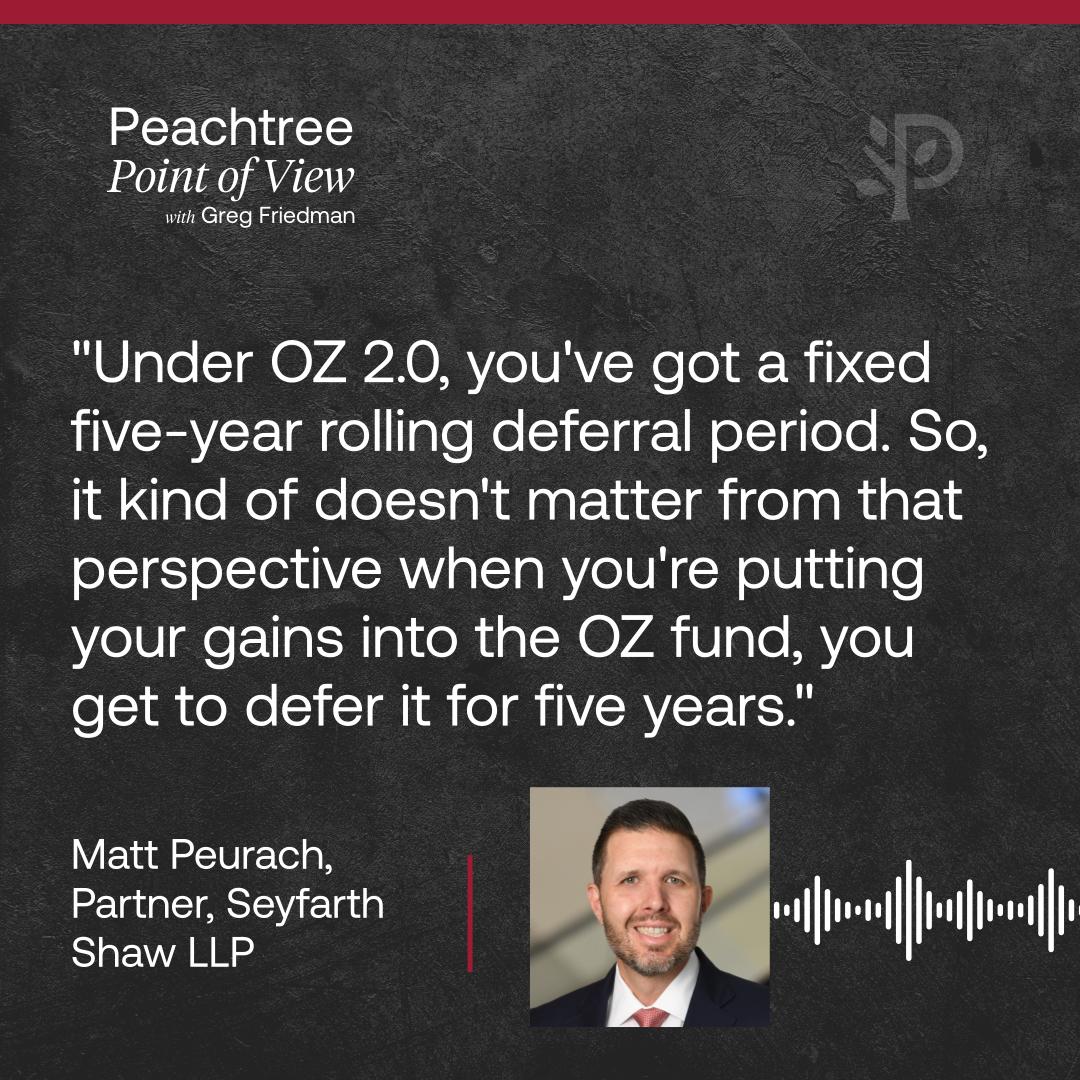Opportunity Zones 2.0: Expert Insights with Matt Peurach and Michael Torhan
This content is adapted from a Bisnow National Opportunity Zones Digital Summit panel moderated by Greg Friedman, CEO of Peachtree Group, featuring Matt Peurach, Partner at Seyfarth Shaw, and Michael Torhan, Tax Partner at EisnerAmper.
The Opportunity Zones program is entering a transformative phase. With OZ 2.0 making the program permanent and introducing enhanced incentives for rural investments, sophisticated investors need to understand how these changes impact both existing holdings and future deployment strategies.
The 2026 Valuation Challenge
For investors who deployed capital into OZ 1.0 funds, December 31, 2026, deferral deadline is approaching rapidly. This creates a critical planning imperative around asset valuation.
"When the deferral period is up, you're paying tax on the lesser of the amount that you put into the OZ fund or the fair market value of your interest on December 31, 2026," explains Matt Peurach. Given commercial real estate valuations have declined approximately 20% on average since 2021, many investors may benefit from establishing current fair market values through formal appraisals.
Michael Torhan emphasizes the importance of documentation: "Fair market value throughout the tax code and throughout case law is generally what would a buyer and seller be willing to exchange for. Obviously, if the asset is still being held, you would want to get some kind of appraisal, some valuation report, really to support that number, to support the tax reporting position."
OZ 2.0 Creates Permanent Framework
The most significant change under OZ 2.0 is permanency. Rather than a fixed endpoint, the program now offers rolling five-year deferral periods for new investments beginning in 2027.
"Under OZ 2.0, you've got a fixed five-year rolling deferral period. So, it kind of doesn't matter from that perspective when you're putting your gains into the OZ fund, you get to defer it for five years," notes Pierock. This structural change eliminates the diminishing returns problem that plagued late-stage OZ 1.0 investments.
Additionally, new Qualified Rural Opportunity Funds offer supercharged benefits. Investments in designated rural zones qualify for a 30% discount on deferred gains versus the standard 10%, along with relaxed substantial improvement requirements. The new rural zone maps will be released in July 2026, creating strategic opportunities for investors who can position assets in advance.

Strategic Considerations for 2025-2026
The transition period between OZ 1.0 and OZ 2.0 presents unique challenges. Investors realizing capital gains today face a compressed timeline, as Pierock points out: "If I'm a taxpayer that realized a capital gain and I'm interested in pursuing a tax mitigation strategy for that and I want to do an opportunity zone investment, number one, I only have one 180 day period to put my gain into an OZ fund."
Furthermore, zone redesignations every 10 years under OZ 2.0 introduce new uncertainty. Projects currently in development within existing zones may face questions about grandfathering if their zone loses designation. While guidance is expected, proactive engagement with state offices regarding zone designations becomes critical for developers with multi-year timelines.
For commercial real estate investors and developers, the message is clear: the Opportunity Zones program remains one of the most powerful tax incentives available, but maximizing benefits requires sophisticated structuring, proactive valuation planning, and close attention to the evolving regulatory framework.
Key Takeaways
- Valuation is Critical for OZ 1.0 Investors: With the December 31, 2026, deferral deadline approaching, investors should obtain professional appraisals to potentially reduce tax liability based on current fair market value versus original investment amount.
- OZ 2.0 Offers Enhanced Rural Benefits: New Qualified Rural Opportunity Funds provide 30% tax discounts (versus 10% standard) and relaxed compliance requirements, with designation maps releasing in July 2026.
- Strategic Timing Matters: The 180-day reinvestment window, combined with tightened poverty thresholds for new zone designations, means investors should carefully evaluate whether to deploy under OZ 1.0 or wait for OZ 2.0 benefits starting in 2027.
Listen to the full discussion on the Peachtree Point of View podcast for deeper insights into structuring Opportunity Zone investments, navigating state-level conformity issues, and capitalizing on the permanent OZ framework. To learn more about Opportunity Zones, read the article “Opportunity Zones 2.0: What Investors Need to Know About the New Tax Law (2025 Update)”. It summarizing a conversation between Greg Friedman and Jason Watkins, partner at Novogradac & Company and chair of the national Opportunity Zones working group.

Please note, this podcast does not provide legal or tax advice. Before investing in any tax-advantaged program, consult with your CPA or a tax attorney to ensure you are eligible to benefit from the program's tax advantages.





